When Lewis Hamilton stuck his Mercedes on pole position for the first race of the 2018 F1 season many took it as a bad sign of the state of F1’s competitiveness this year.
For those hoping for a close championship fight it brought the worrying suspicion that 2017 had been a blip, and that Mercedes had put daylight between themselves and their rivals once again.
Two races later Sebastian Vettel is sat on a perfect 50. What more, the Bahrain Grand Prix was much a livelier affair than the season-opener in Melbourne> The outcome was genuinely in doubt over the final laps, something which happens all-too-rarely in Formula One.
Ferrari seize the initiative
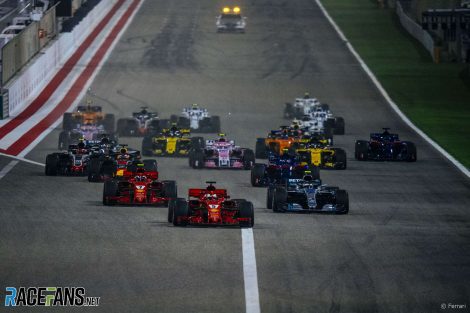
Yet in the race Mercedes were able to take the fight to Ferrari. It served to indicate Mercedes much-vaunted ‘party mode’ was, as chief executive Toto Wolff insisted, not the explanation for why Hamilton suddenly went so much quicker at the end of Q3 in Melbourne.
Today’s teams are so professional and so rich in resources there are few performance variables they haven’t mastered. But in this case early-season uncertainty about exactly how tyres would perform helped create a nail-biting race.
Mercedes took note of Fernando Alonso’s pace after his early switch to medium compound tyres. Once they’d lost the opportunity to give Valtteri Bottas an advantage by pitting him before leader Vettel, putting him on mediums for a run to the end was a smart move which put Ferrari on the back foot. Impressively, Vettel eked out his soft tyres long enough that only on the final lap did Bottas get within range to mount an attack, and by then it was too late.
But whatever the exact details the encouraging point ‘neutrals’ should take away from the first two races is this: There are at least two teams at the sharp end of the field who are close enough in performance that they can genuinely rival each other for victory. That allows us to appreciate the differences in driver skill, strategy and teamwork which decide victory and defeat – and not just who has the best power unit.
Advert | Become a RaceFans supporter and
The Red Bull mystery
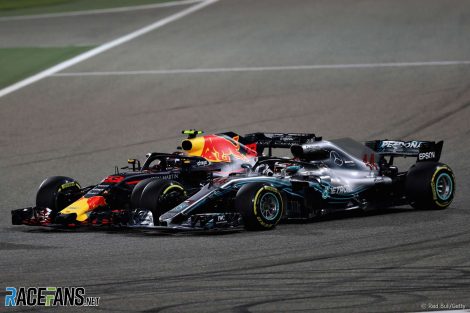
In Bahrain they suffered a disaster. Ricciardo’s car switched itself off on lap two. Moments earlier Max Verstappen paid the price for playing hard-ball with Hamilton by picking up a puncture at turn one. Associated damage forced a retirement soon afterwards.
Where they might have been when the chequered flag fell remains one of the great unknowns of the race. As Christian Horner pointed out the team could have been well-placed to capitalise on Mercedes and Ferrari’s switch to one-stop strategies instead of the super-soft/super-soft/soft approach which Pirelli reckoned was the optimum.
“Nobody actually ran the ultimate race today,” said Horner. “If we had stuck to our plan we’d have been looking pretty competitive today. The two stop was the faster race.” Had Ricciardo been around to run it, where might he have figured in the fight at the end? Hopefully we get our answer in future races.
Bottas found wanting
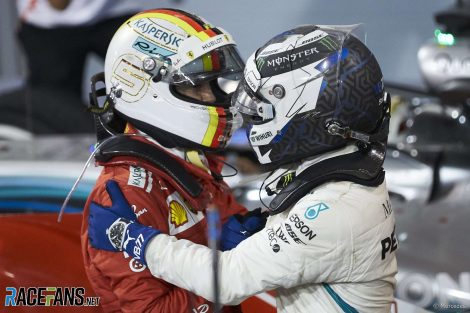
But following a very poor weekend in Australia, and with persistent chatter about his contract in the background, Bottas undoubtedly missed an opportunity to earn serious brownie points within the team by taking a win from Ferrari.
His glance at the inside of Vettel at the final corner was a half-hearted affair. What might have been done by someone like Ricciardo, who has almost trademarked the art of pointing a car at an apex and braking outrageously late to force a pass?
Bottas always seemed a conservative driver during his Williams days. Then it was justifiable: That was a team which needed to avoid retirements, gather points and secure prize money. Mercedes demand victories and here was a chance to take one.
It isn’t the first time Bottas’s racecraft has been found wanting – recall how easily Vettel slipped by him at the start in Brazil last year. This was clearly a better weekend for him – he out-qualified Hamilton and passed Raikkonen at the start. But fairly or otherwise, it will be remembered for that hesitant half-look at the Ferrari.
Advert | Become a RaceFans supporter and
Ferrari’s pit stop disaster
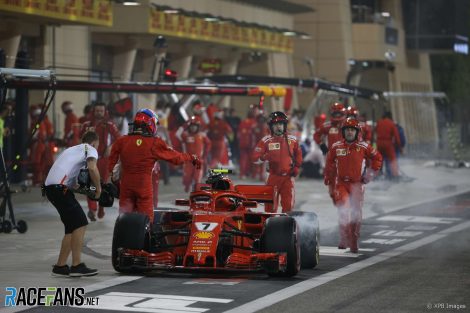
Plan D was the unlikely super-soft/soft strategy which Vettel used to win the race (plans A, B and C being combinations of super-soft/soft/soft, super-soft/super-soft/soft and soft/medium). And the “issue” was of course much more serious than Vettel needed to know about at that stage.
Fortunately Francesco Cigarini, Ferrari’s left-rear ‘wheel off’ who was sent flying when Raikkonen was sent from the pits too soon, has had surgery on his leg fractures and already posted video on social media of himself hobbling around the Bahrain Defense Force Hospital on crutches.
However the alarming incident provoked questions over whether more needs to be done to prevent mechanics being hurt in this way. FIA race director Charlie Whiting pointed out that the disincentive for teams to get pit stops wrong is naturally very high, as it means they lose a car from the race.
Could F1 then require teams to put fewer mechanics in the line of fire by limiting how many of them are allowed to work on the car? The mathematics of this are persuasive: F1 could potentially take over 100 mechanics out of harm’s way by adopting a limit of six people per stop.
But it bears pointing out that IndyCar already has such a limit yet pit stop incidents are still common. There were several in Saturday night’s race in Phoenix. However IndyCar mechanics do more dangerous work (i.e. refuelling) in more cramped conditions.
Tough times in the midfield
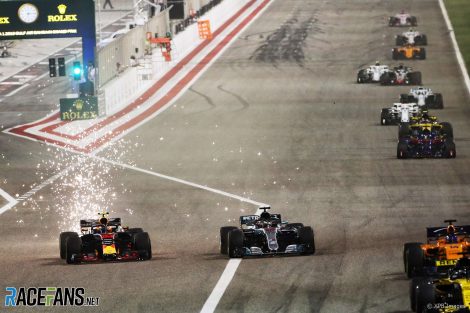
As a result the pecking or was very different in Bahrain compared to Melbourne. Toro Rosso, ninth-quickest of the 10 teams in Australia, set the fifth-best time in Bahrain and grabbed fourth in the race thanks to an inspired drive by Pierre Gasly.
Williams fell from eight to very last. ‘Very’ because not only were they the only team who couldn’t get around Bahrain any quicker than last year, they were slower to the tune of 1.3 seconds.
And the satisfaction McLaren took from fifth place in Australia can only have dissolved when both MCL33s were out-qualified by both Toro Rosso-Hondas. At least their cars, which suffered cooling problems in testing, endured the Bahrain heat.
With Haas bouncing back from their Melbourne disaster to take a strong fifth and Nico Hulkenberg putting the factory Renault in sixth, McLaren were the slowest Renault team in Bahrain and will be aware most of their points on Sunday came through other cars not finishing.
Go ad-free for just £1 per month
>> Find out more and sign up
2018 Bahrain Grand Prix
- Top ten pictures from the 2018 Bahrain Grand Prix
- Vettel’s narrow win bodes well for 2018 title fight
- 2018 Bahrain Grand Prix Star Performers
- McLaren go 100 races without a win as Hamilton equals Raikkonen record
- Vote for your 2018 Bahrain Grand Prix Driver of the Weekend
F1 race reviews
- Shanghai sees both sides of Verstappen with dominant victory
- Verstappen springs Red Bull back to winning ways at unexpectedly warm Suzuka
- Sainz shows surgical precision as Verstappen’s hopes melt in Melbourne
- Virtually unbeatable Verstappen puts simracing aside to collect Jeddah win
- Amid accusations, Red Bull resume “business as usual” with crushing one-two




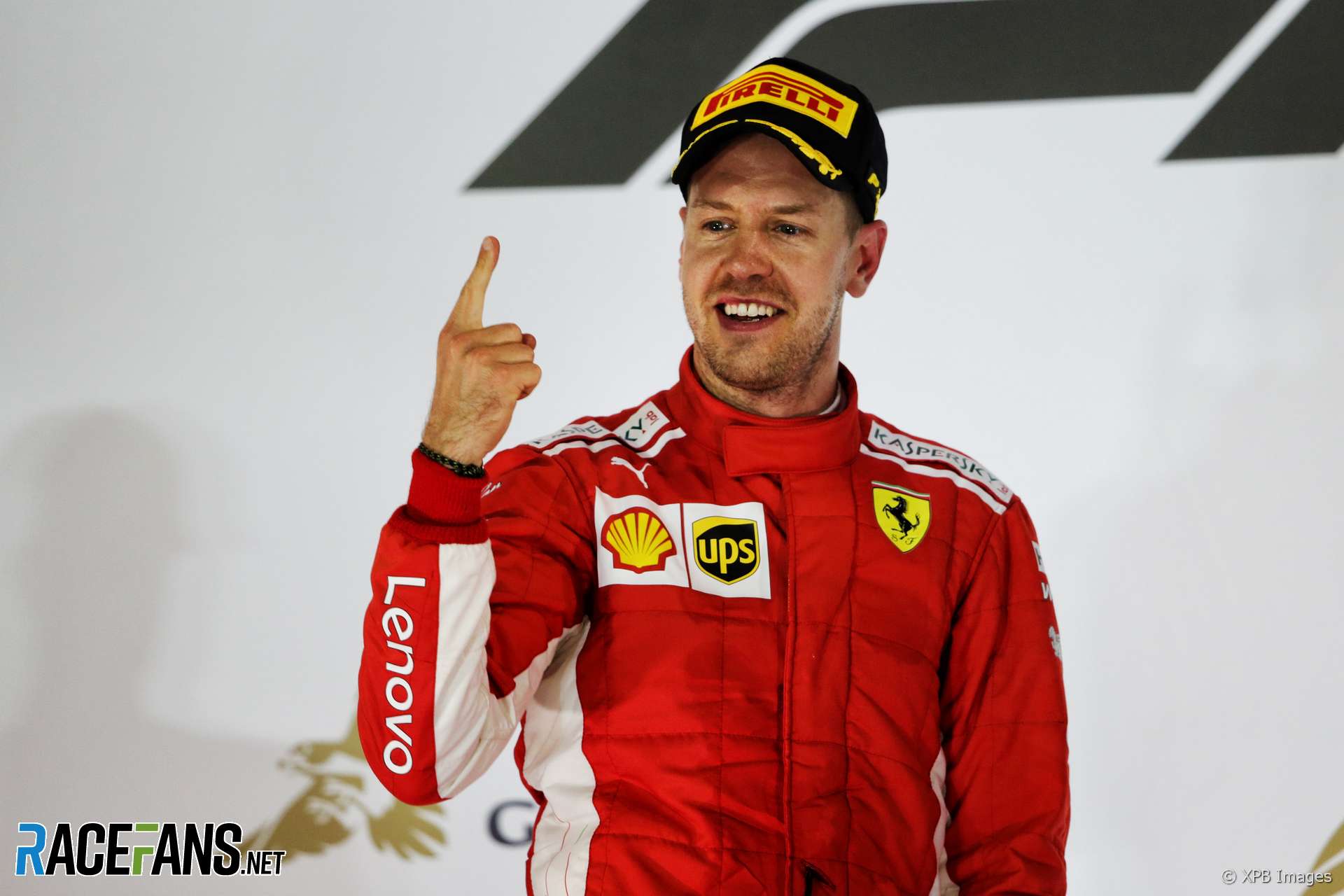
David
9th April 2018, 22:49
Mercedes still have the best car at this point in the season – perhaps not by much, but by enough to suggest that Vettel’s points margin is far from safe.
Both Vettel’s win’s this year have shown his mastery of a “Grand Prix”. In Melbourne he saved his car while sat behind Kimi in order to make the most of his long first stint, and opportunity came his way. Yes, it was decided by a second under the VSC – but Vettel is the kind of driver who always makes those seconds count, while Mercedes and Hamilton faff around trying to control their pace (I believe a major part of this tactic is to avoid showing the rulemakers how much pace they REALLY have).
In Bahrain, the tyre compounds were just outside what Mercedes wanted for the ultimate qualifying pace, but their pace on the Mediums showed that they could probably have won the race by the best part of a pitstop if Ferrari had gone through with the two-stop strategy. As it was, Vettel put together a brillant display of driving on the canvas, conserving the car in the areas Bottas couldn’t pass, before delivering the exact corner exit he needed onto the fast sections. Hamilton’s penalty and mid-race confusion about his target times helped and I think he would have been much harder to keep behind.
Vettel won’t be able to pull results out of the bag like this for the rest of the season. He just needs to hope that Ferrari keep up in the development race and that he can keep maximising the results.
PS My feeling is that Red Bull have gone too extreme with the high-rake concept and the rear end is too close to the limit for Verstappen. Ricciardo may have more stability in the car (or in his style) – but he just isn’t as fast. Could be a difficult season ahead.
Kribana (@krichelle)
10th April 2018, 7:54
I was shocked with the Mercedes pace at the end of the first stint as Valterri was closing down Vettel by 3-5 tenths per lap and then Seb pitted. I was also shocked by Mercedes pace on the Medium tyre. No wonder they were doing chunks of long runs with those tyres during the winter. Mercedes is the better race car at the moment and who knows what Lewis could have done had he not had the penalty. Plus, we forget about the Red Bulls too.
Strontium (@strontium)
9th April 2018, 23:11
If Ferrari have got any chance of taking the championship fight to Mercedes, every single point counts.
I feel a bit sorry for Raikkonen so far this year. He isn’t on the same level as Vettel but his results don’t reflect how close it has been
Strangely Brown (@irukaviking)
10th April 2018, 0:34
”Two races later Sebastian Vettel is sat on a perfect 50”
Keith – this is awful grammar and doesn’t adhere to the rules of Received Pronunciation. It should read ”Two races later Sebastian Vettel is sitting on a perfect 50”.
Strontium (@strontium)
10th April 2018, 1:41
@irukaviking +1, sadly it seems grammar no longer exists.
Even ‘professional’ commentators (who are being paid to talk) like David Croft and Ben Edwards seem unable to say ‘going to’. I suppose some would say I’m nit picking
Kribana (@krichelle)
10th April 2018, 7:55
Sentence is grammatically correct but it sounds bad to the ear.
David Not Coulthard (@davidnotcoulthard)
10th April 2018, 11:52
> @irukaviking +1, sadly it seems grammar no longer exists.
@strontium In a language which have changed their way of calling 2-digit numbers (four-and-twenty, three-and-twenty, etc have ceased being a thing. Compare that to Dutch and German), have deviated quite far in the pronunciation of words from how they’re (still) spelt, and refers to 10^9 and 10^12 as “billion” and “trillion” respectively (you’d expect billion to be million squared, and trillion to be million cubed, as they are in many other languages), your complaints would be the least of the problems English has.
David Not Coulthard (@davidnotcoulthard)
10th April 2018, 11:53
well that’s not how you quote someone here. My bad.
Phylyp (@phylyp)
10th April 2018, 2:53
I’ve heard this form of verb being used by Brits, so maybe its a cultural regional thing? This discussion might also be enlightening.
Damon (@damon)
10th April 2018, 8:24
What has pronunciation got to do with a written text?!?
Phylyp (@phylyp)
10th April 2018, 2:54
Thanks for clearing up the confusion of whether we heard “Plan B” or “Plan D”, and for laying out what the different plans were.
Phylyp (@phylyp)
10th April 2018, 3:04
Alright, that’s good to hear, and good spirit from him as well.
While a good argument, the part of me that is not rational would not wish to happen. For me, F1 pit stops are one of the coolest parts of F1 – the synchronized ballet that’s over in seconds.
The other style of limiting pit crew just ends up looking a bit clumsy, when I’ve seen it in US series – with a bunch of people hopping over a wall, etc.
That said, I do hope that if such a change is made, it is made with due recognition of the benefits that it offers. If we want to decongest the pitlane maybe we should get the FOM TV crew out of there as a start, and switch to cable-mounted cameras (similar to what runs along the pitwall).
Helge
10th April 2018, 9:41
How about putting a few more sensors on the cars, to “inspect” the area between the front/rear tyre. If there’s something(/someone) occupying that space, car will refuse to accelerate from a stand-still. That can’t be very hard, very expensive, or very weight-adding to implement on the F1 cars?
Erzen (@)
10th April 2018, 9:50
This is very spot on. I’m just a humble admirer but in my honest opinion i think Sunday’s accident was just that, a freak accident, and it won’t be easy to repeat. It’s good that the FIA is going to have a look into it but i think there’s no need for changes in pit stop procedures as a result of it.
Erzen (@)
10th April 2018, 9:53
I was surprised to see how many pundits and journalists criticised Bottas’ racecraft. I might be wrong but wasn’t he known to be very calculative (i.e take his sweet time) when it came to attempting passes? I liked it when he took a lap or two to set the other driver up before he easily passed them. I agree that it coud’ve been better if he went balls out on the last lap but he risked taking both himself and Vettel out of the race and imo it wouldn’t have been worth it.
Neil (@neilosjames)
10th April 2018, 10:27
I think, if Bottas had managed to have a good weekend in Australia, he’d have punted it up the inside on the final lap and taken whatever result came from it… a race win, a broken front wing, retirement, taking Vettel out, penalties, etc.
But because he’d messed up in Melbourne and was already under pressure, he made a decision to abandon the risk-taking in favour of a secure haul of points.
Can’t blame him…
Lums (@lums)
10th April 2018, 10:42
@neilosjames
…or he’s just doesn’t have what it takes. Too many excuses for bottas, too many. We still have people commenting ‘oh, he is still settling in the team, give him another 5 season and he’ll be unstoppable.
If it’s taking that long for a driver to shake up a bad weekend, then he should not be racing.
Krommenaas (@krommenaas)
10th April 2018, 10:34
Let’s just appreciate that Bottas didn’t attempt a desparate dive bomb, taking out Vettel and ruining the championship. I get the feeling that if the team had told him sooner that Vettel wasn’t going to pit again, he would have won this race easily.
Balue (@balue)
10th April 2018, 11:44
@krommenaas Yes. No doubt Bottas knows his place in the team and a one-year contract will not embolden him any, but it seems last time was just as much the team holding him back like you say. I still don’t understand why the team didn’t ask him to turn up the engine and give him target lap times like they did his team mate. He obviously had the better tyre and good pace so an attack should have been initiated as soon as they realized Vettel was managing. When they finally let him go after Vettel it was already too late. I doubt anyone would have made that pass at the end.
Balue (@balue)
10th April 2018, 11:44
@krommenaas Yes. No doubt Bottas knows his place in the team and a one-year contract will not embolden him any, but it seems last time was just as much the team holding him back like you say. I still don’t understand why the team didn’t ask him to turn up the engine and give him target lap times like they did his team mate. He obviously had the better tyre and good pace so an attack should have been initiated as soon as they realized Vettel was managing. When they finally let him go after Vettel it was already too late. I doubt anyone would have made that pass at the end.